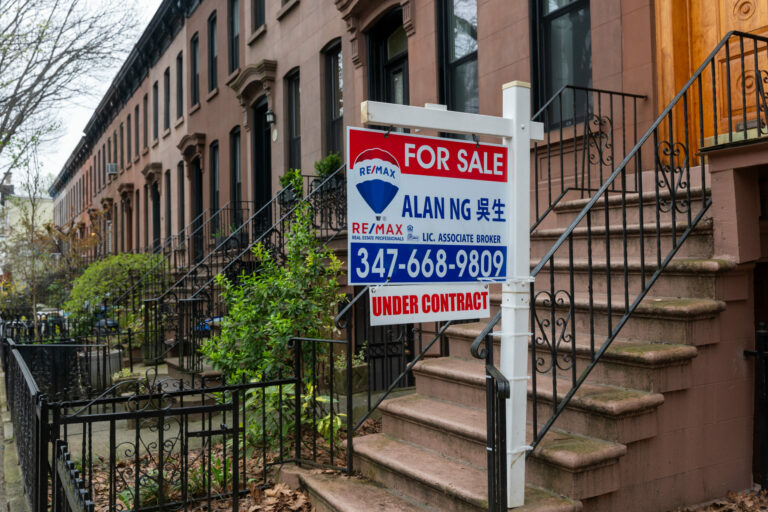A “Sale Pending” sign hangs in front of a property in San Francisco in 2023. Last Saturday, the National Association of Realtors introduced policies that changed the payment process for real estate agents representing home buyers.
Jeff Chiu/Associated Press
There’s been a major shake-up in how you buy and sell your home in America — and those in the Bay Area’s ultra-pricey and ultracompetitive housing market are watching closely to see how these changes might affect them.
This past Saturday, the National Association of Realtors implemented new policies that affect how real estate agents get paid when they represent a home buyer.
Article continues below this ad
Previously, in the vast majority of real estate transactions, the seller covered the commission fees for both the seller’s agent and the buyer’s agent. That commission percentage was baked into the price of the house. When homes were listed on the real estate database called the Multiple Listing Service, agents could see what percentage commission they would get if someone they represented bought the home.
For the buyer, their real estate agent’s services were “free,” in that they did not pay the agent out of pocket during the transaction.
A lawsuit upended this longtime practice. A group of home sellers in Missouri argued in a class action lawsuit that the practice violated antitrust laws. So the National Association of Realtors, a trade association that represents real estate agents and brokers, agreed to a settlement that changed the rules.
Those changes represent “the biggest shake-up to real estate in the United States in the past 200 years,” said Nikki Edwards, a real estate agent in the Bay Area.
But in Northern California’s tight markets, she said she doesn’t see the changes “being a factor that’s going to move the needle in terms of dropping prices dramatically to even affordable levels.”
Article continues below this ad
If you’re planning to buy or sell a home in the near future, the process is going to be different. Here’s what to expect.
Changes for buyers
How it worked before: A real estate agent could show a potential buyer a house without establishing any sort of contract between the parties. Buyers had no say in what commission the agent would receive if they bought a house.
Though the buyer’s agent was not working “for free,” said Vanessa Gamp, the president of the San Francisco Association of Realtors, “the buyer was not paying up front for the services. The agent was being paid through the shared listing agents’ commission” via the seller from the proceeds from the home sale.
How it works now: A buyer will need to enter into a written agreement stating how their real estate agent will get paid before the agent can show them a house.
Article continues below this ad
Vince Malta, the former president of the National Association of Realtors and a real estate agent in San Francisco, outlined what the agreement must contain.
“The relationship and how compensation is going to be paid, how the agent will be compensated, what the rate will be — is it a fee, a percentage, something else — and it will include a statement that the agent will not receive compensation from any source other than what they’ve agreed to in this written agreement,” Malta said. The agent and buyer will also agree on the duration of the contract. It could be for a few months or longer, or it could just cover one house showing.
So buyers now have the opportunity to decide what they think their agent’s time is worth. Buyers can negotiate the traditional percentage commission on the purchase price or negotiate a flat fee, an hourly rate or some other arrangement. The realtor can agree to that or not.
This change doesn’t necessarily mean buyers will have to pay their agent’s fees out of pocket and up front — or at all. Sellers are still allowed to fold the buyer’s agent’s commission into the purchase price. They just aren’t agreeing to do that up front like they used to.
It’s too early to tell whether nontraditional payment arrangements will become popular: The rules only went into effect this past Saturday. So far, Gamp said, she hasn’t been approached by any buyers seeking an alternative style of payment. And none of the real estate agents interviewed for this story said they’ve heard from sellers who say they won’t agree to the traditional method of baking the commission into the sale price.
Article continues below this ad
So-called discount agents already exist — websites and platforms that will draw up an offer letter for a flat fee — and they might become more popular, Gamp said. But a competitive real estate agent who can pick and choose clients probably won’t take one trying to get a bargain.
“San Francisco’s a really sophisticated, complicated market. And most agents that are out here selling real estate for a living are putting in a ton of time and effort,” she said. “In order to be successful, you’re typically working with an agent that does this full time, and those agents want to be paid appropriately for the work that they’re doing.”
Changes for sellers
How it worked before: In most cases, the seller agreed to pay their agent and the buyer’s agent before the house was listed on MLS. That agreement often involved a cooperating commission amount based on the purchase price of the house — typically 5%-6%, though that percentage was always negotiable — and split between the two agents. That commission was listed on MLS, so other real estate agents could anticipate what they’d make on a sale.
How it works now: The seller is not required to agree up front to cover the buyer’s agent costs. Any commission that might be offered to a buyer’s agent will not be listed on MLS.
Article continues below this ad
Buyers will have the option to make an offer that includes a percentage they intend for the seller to pay as commission to their agent. A seller can agree to that — and has good incentive to, Gamp said. Limiting your potential buyer pool to people who can pay their agent out of pocket in addition to their down payment means you might get fewer offers or fewer competitive ones, especially in a market like San Francisco that’s already so pricey.
“A buyer is going to have a finite budget no matter what,” Gamp said. “So if they are also required to pay commission, that means they will have less of a budget for the purchase.”
What about open houses?
The new policy change doesn’t extend to open houses. You can still casually drop in to one without having to sign a contract under the new NAR rules. A listing agent might ask you to sign something before you see an open house. But they are not required to under the NAR settlement rules.
“That is the one carve-out the NAR made very clear,” Gamp said. There was some confusion about this at first, she said, but “public open houses is the one scenario where a buyer would not need to have a signed agreement in order to see the property.”
Will this change bring down home prices?
When the settlement was announced, some industry watchers predicted it would bring down prices by putting buyers in the driver’s seat when it comes to how their agents were compensated. Buyers could negotiate a flat fee or lower percentage payout. Or the changes could reduce competition for homes by removing casual shoppers from the market who are wary of signing a binding agreement up front.
But buyers have very little leverage to begin with in California’s super tight market, and they have lots of competition. Malta said he doesn’t see these changes moving the needle.
“I think it’s really speculative to say this is going to affect home prices,” he said. “There are greater market conditions such as inventory and mortgage interest rates that are much bigger factors.”
If anything, it could make things harder for buyers, Edwards said.
“If you’re placing an offer, and if now we’re competing with other people and we don’t know what they’re offering in terms of commission now, we don’t really know how that seller’s going to look at the offers,” she said.
Ultimately, buyers will have more transparency into pricing with their agent. But the changes add a layer of paperwork and complexity to a process that was already notorious for both of those things.
Reach Jessica Roy: jessica.roy@sfchronicle.com
This article was originally published by a www.sfchronicle.com . Read the Original article here. .










